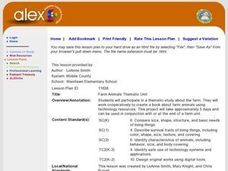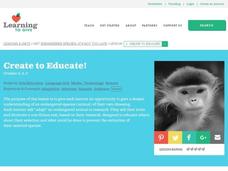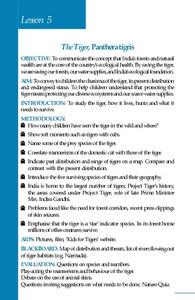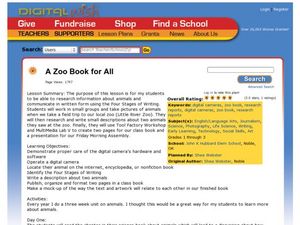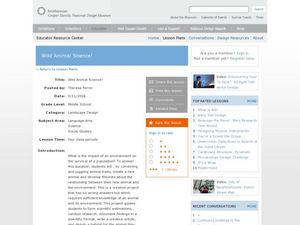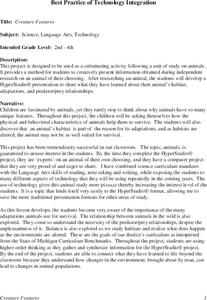Curated OER
Creating a Food Web
Students investigate hunters and prey by creating a food web. In this animal life lesson, students investigate a single organism in preparation for a field trip, discovering its diet and habitat. Students each discuss their animal with...
Curated OER
Farm Animals Thematic Unit
Student study farm animals by watching a teacher made PowerPoint presentation and visiting a farm. They research a farm animal with teacher assistance. They design a book about the animals using available technology and orally present...
Curated OER
Web of Life - Role-Playing
Students role-play how organisms adapt to their environment. They play 20 questions with plant and animal habitats. They create a web of life to demonstrate how each plant and animal relies on the other for survival.
Curated OER
Cardboard Tree and Endangered Animals Lesson
Students create endangered animal figures and their habitats.
Curated OER
Endangered Species... It's Not Too Late
Students choose an endangered species to research and report on. In this endangered species lesson, students complete a worksheet to gather information about their endangered animal and then use to write a book about the animal and...
Curated OER
Hide In Plain Sight
Students view video clips and use the Internet to look for hidden animals. They then use the Internet to print out animal shapes and color them. They create environments on construction paper in which their animals can hide.
Curated OER
Enemies and Threats to Sea Horses
Students research threats and enemies of the sea horse. In this animal biology lesson, students use the Internet to find threats and enemies of sea horses and write a paragraph on their findings.
Curated OER
The Tiger, Panthera Tigris
Students explore tigers, India's national animal, discuss importance of protecting tigers and Earth's diverse ecosytems, investigate distribution of tigers in world, identify characteristics of tigers, examine natural habitat, and...
Curated OER
How Many Penguins Does It Take? Studying Carrying Capacity and Limiting Factors
How does a population's habitat determine the size of that population? Teach learners about carrying capacity and limiting factors with an engaging roleplay activity. Class members pose as a colony of penguins who must gather food amidst...
Curated OER
What's Wild
Third graders discover the differences between wild and domestic animals. In this animal lesson, 3rd graders chart the differences in the animals and look through magazines for pictures of wild and domestic animals to glue to a poster....
Curated OER
A Zoo Book for All
A visit to the local zoo launches an integrated life science/ language arts research project into the habitat, feeding habits, offspring, lifespan, and other interesting facts about animals. Each group selects two animals to photograph...
Curated OER
Pio, Pio, Que Frio
Students investigate the characteristics of living things. They determine that different organisms have different needs and describe and compare them. They draw and verbally respond about their favorite animal.
ARKive
Penguin Diversity – Mask Making
Penguins are very diverse and well-adapted birds; they live on islands, in warm and cold climates. Little ones examine penguin diversity and discuss the highly functional adaptive traits that have helped them survive in some of the...
Curated OER
Wild Animal Science
Students discover how environmental factors impact the survival of a population. For this landscape design lesson, students create a new animal and discuss the relationship between the animal and its environment before creating a habitat...
Curated OER
Life Processes
Students identify life processes and create their own creature. In this creative science lesson, students identify an organism's life processes and categorize them into groups. They then create their own creature and write about how it...
Curated OER
Spatial Characterization of Animal Movement
Students identify biotic and abiotic factors which may alter the observed patterns in plant communities with different structural characteristics, climate, or environmental constraints.
Curated OER
Stormy Weather
Fifth graders compare human and wildlife environments. In this stormy weather lesson, 5th graders imagine they are an animal or human during a storm. Students compose a story with comparisons and reasons for how an organism's habitat...
Curated OER
Creature Features
Students investigate animals and how they adapt to their environment. They design a multimedia presentation that includes information about an animal of their choice. They include a title card, habitats, adaptations, and a predator/ prey...
Curated OER
Citizens For the New Zoo
Third graders complete Internet research to find information about an animal and its basic needs. They design a model of a zoo habitat that would accommodate their animal. They write a letter of recommendation to a Zoo board of directors...
Curated OER
Animals in Inspiration
Students research information on a specific animal. In this animal lesson plan, students use books to find information about an animals diet, habitat, appearance, and any other interesting facts. Students will use this information to...
Curated OER
Rainforests: What Are They?
Second graders investigate rain forests by reading a habitat checklist. In this environment lesson, 2nd graders read the book The Great Kapok Tree, and discuss what characteristics make up a rain forest. Students explore a habitat...
Curated OER
Lake and Pond Study
Learners examine the habitat and community structure of a pond that could support Ospreys through games and worksheets. They then go on a field trip to a pond to evaluate the suitability of the pond as an Osprey habitat.
Curated OER
Photomosaic Pixel Composite
Learners select an animal to research. After completing the research they illustrate and paint their animal in the style of a Japanese scroll. Their illustrations are scanned into the computer and imported to PowerPoint. Students...
Curated OER
Animal Homes
Children visit one particular website to explore animals that live in different habitats. After visiting the website, they choose to research one habitat and the animals that live there. They create a poster about their animal and where...



